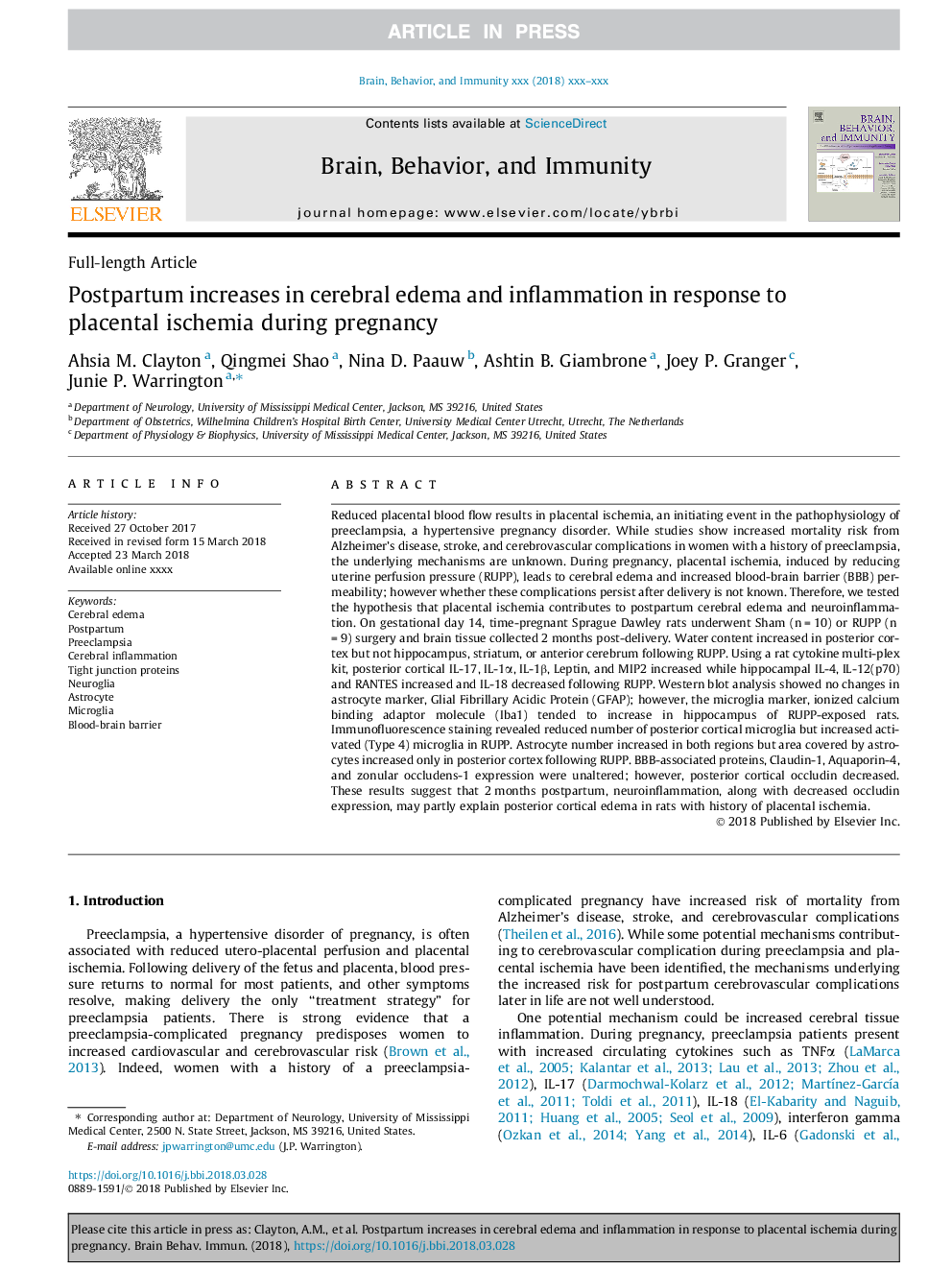| کد مقاله | کد نشریه | سال انتشار | مقاله انگلیسی | نسخه تمام متن |
|---|---|---|---|---|
| 7279308 | 1473896 | 2018 | 14 صفحه PDF | دانلود رایگان |
عنوان انگلیسی مقاله ISI
Postpartum increases in cerebral edema and inflammation in response to placental ischemia during pregnancy
ترجمه فارسی عنوان
پس از زایمان در ادم مغزی و التهاب در پاسخ به ایسکمی جفت در طول بارداری افزایش می یابد
دانلود مقاله + سفارش ترجمه
دانلود مقاله ISI انگلیسی
رایگان برای ایرانیان
کلمات کلیدی
ادم مغزی، پس از زایمان، پره اکلامپسی، التهاب مغزی، پروتئین های اتصال تنگ، نورلوژی، آستروسیت، میکروگلایا، مانع خون مغزی،
موضوعات مرتبط
علوم زیستی و بیوفناوری
ایمنی شناسی و میکروب شناسی
ایمونولوژی
چکیده انگلیسی
Reduced placental blood flow results in placental ischemia, an initiating event in the pathophysiology of preeclampsia, a hypertensive pregnancy disorder. While studies show increased mortality risk from Alzheimer's disease, stroke, and cerebrovascular complications in women with a history of preeclampsia, the underlying mechanisms are unknown. During pregnancy, placental ischemia, induced by reducing uterine perfusion pressure (RUPP), leads to cerebral edema and increased blood-brain barrier (BBB) permeability; however whether these complications persist after delivery is not known. Therefore, we tested the hypothesis that placental ischemia contributes to postpartum cerebral edema and neuroinflammation. On gestational day 14, time-pregnant Sprague Dawley rats underwent Sham (nâ¯=â¯10) or RUPP (nâ¯=â¯9) surgery and brain tissue collected 2â¯months post-delivery. Water content increased in posterior cortex but not hippocampus, striatum, or anterior cerebrum following RUPP. Using a rat cytokine multi-plex kit, posterior cortical IL-17, IL-1α, IL-1β, Leptin, and MIP2 increased while hippocampal IL-4, IL-12(p70) and RANTES increased and IL-18 decreased following RUPP. Western blot analysis showed no changes in astrocyte marker, Glial Fibrillary Acidic Protein (GFAP); however, the microglia marker, ionized calcium binding adaptor molecule (Iba1) tended to increase in hippocampus of RUPP-exposed rats. Immunofluorescence staining revealed reduced number of posterior cortical microglia but increased activated (Type 4) microglia in RUPP. Astrocyte number increased in both regions but area covered by astrocytes increased only in posterior cortex following RUPP. BBB-associated proteins, Claudin-1, Aquaporin-4, and zonular occludens-1 expression were unaltered; however, posterior cortical occludin decreased. These results suggest that 2â¯months postpartum, neuroinflammation, along with decreased occludin expression, may partly explain posterior cortical edema in rats with history of placental ischemia.
ناشر
Database: Elsevier - ScienceDirect (ساینس دایرکت)
Journal: Brain, Behavior, and Immunity - Volume 70, May 2018, Pages 376-389
Journal: Brain, Behavior, and Immunity - Volume 70, May 2018, Pages 376-389
نویسندگان
Ahsia M. Clayton, Qingmei Shao, Nina D. Paauw, Ashtin B. Giambrone, Joey P. Granger, Junie P. Warrington,
